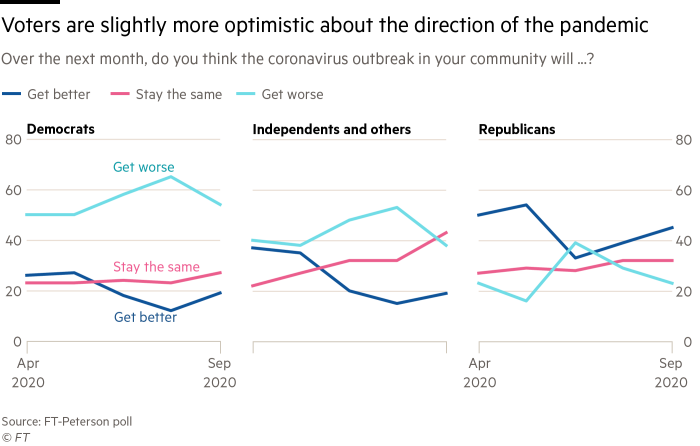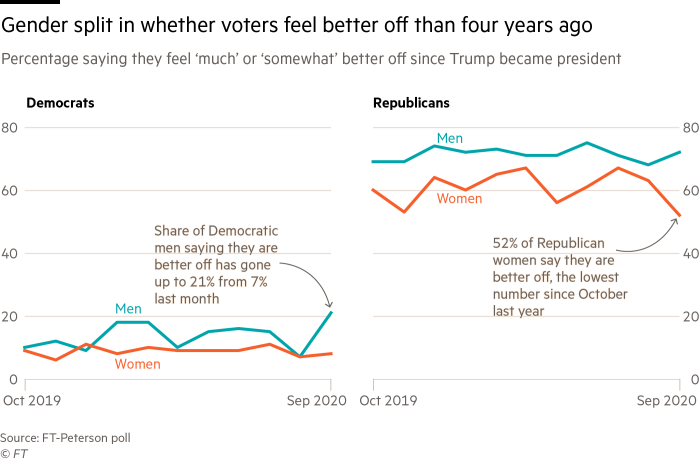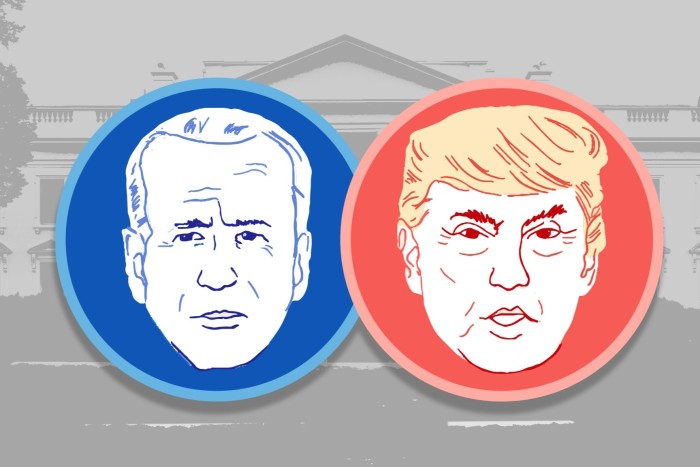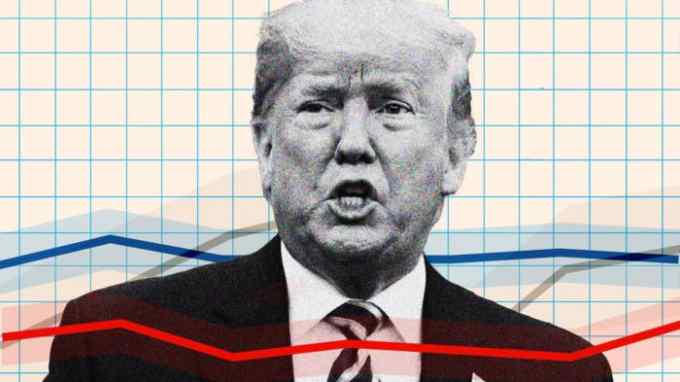Vast majority of Americans want more economic aid to offset Covid

Roula Khalaf, Editor of the FT, selects her favourite stories in this weekly newsletter.
Americans are becoming increasingly pessimistic about the US economic rebound, with almost 90 per cent saying Washington needs to pass a new stimulus package to mitigate the fallout from the coronavirus pandemic.
The growing concern about the economy, detailed in a new poll of likely voters for the Financial Times, comes even as Americans increasingly believe the country has turned the corner after the spike of infections this summer, which forced several states to slam the brakes on reopening plans.
The monthly survey for the FT and the Peter G Peterson Foundation found that more than 60 per cent of Americans believe the outbreak — which has killed almost 200,000 people in the US — is either staying the same or getting better in their local communities, the most optimistic outlook since the summer outbreak began.
But that optimism has been tempered by renewed fears about the country’s financial situation, with 42 per cent now saying they were more worried about the economy than public health — a 9-point jump from a month ago.
Only a third of American voters think the US economy will fully recover within the next year, the same as during the depths of the summer outbreak and significantly lower than the 44 per cent who believed in April that a rebound would take less than a year.

The FT-Peterson poll also sought to gauge voter concerns about the conduct of November’s election. Two-thirds said they still had confidence in the integrity of the voting process, despite Mr Trump’s repeated warning the election could be “rigged”.
Still, 40 per cent did not believe postal voting was secure and reliable and 61 per cent said they intended to vote in person, either on election day or in early voting opportunities. That compares to the 41 per cent of voters who cast their ballots before election day in 2016, according to the Election Assistance Commission.
The White House and congressional Democrats have been locked in a stand-off over a new round of economic stimulus since enhanced unemployment benefits, one of the main provisions in earlier emergency spending legislation, expired more than a month ago.
The FT-Peterson survey showed voter anger targeting both sides of the aisle, with a plurality of 39 per cent saying Democrats and Republicans were “equally responsible” for the failure to pass additional economic aid.
The remaining voters were almost equally split, with 26 per cent blaming Republicans and 23 per cent saying Democrats were responsible for the stalemate.
Most analysts and economists had expected a new stimulus package worth more than $1tn to be enacted in July, but over time their hopes have dwindled.
Now, with November’s presidential election looming, chances of bipartisan agreement on Capitol Hill are slim — especially against the backdrop of an already fierce debate over when to fill the Supreme Court vacancy created by justice Ruth Bader Ginsburg’s death last week.
The poll demonstrates the challenges facing Donald Trump and Joe Biden heading towards the November 3 election day, with both Democrats and Republicans facing new challenges to their prevailing campaign themes.

The Biden campaign is seeking to make the campaign a referendum on Donald Trump’s handling of the coronavirus pandemic, even as the outlook has improved from the summer outbreak.
Republicans maintain Mr Trump is best suited to rebuild a US economy that has been battered by Covid-19 at a time of increased pessimism over his handling of the economy. The FT-Peterson poll showed only 45 per cent of Americans believe Mr Trump’s policies have helped the economy, the lowest level this year.

The FT-Peterson poll seeks to follow whether likely voters feel better or worse off since Mr Trump became president in 2016. Ronald Reagan defeated Jimmy Carter in the 1980 election after asking US voters: “Are you better off than you were four years ago?”
Thirty-five per cent of respondents in September said they were better off since Mr Trump became president, compared to 31 per cent who said they were worse off. Another 35 per cent reported no change.
Women were far less likely to report being better off under a Trump presidency, with just 26 per cent of women saying they were better off, compared to 45 per cent of men — the widest gender gap recorded since the FT first started asking the question almost a year ago.
Trump vs Biden: who is leading the 2020 election polls?

Use the FT’s interactive calculator to see which states matter most in winning the presidency
Among women who identified as Republicans, 52 per cent said they were better off, another all-time low for the FT-Peterson poll. However, at the same time, the share of Democratic men saying they are better off rose sharply between August and September, going from just 7 per cent to 21 per cent in the latest poll.
The FT-Peterson Poll was conducted online by Global Strategy Group, a Democratic polling company, and North Star Opinion Research, a Republican group, between September 9 and September 14. It reflects the opinions of 1,003 likely voters nationwide and has a margin of error of plus or minus 3 percentage points. The Peterson Foundation is a non-partisan, non-profit organisation focused on America’s fiscal challenges.
Additional reporting by James Politi in Washington

Comments